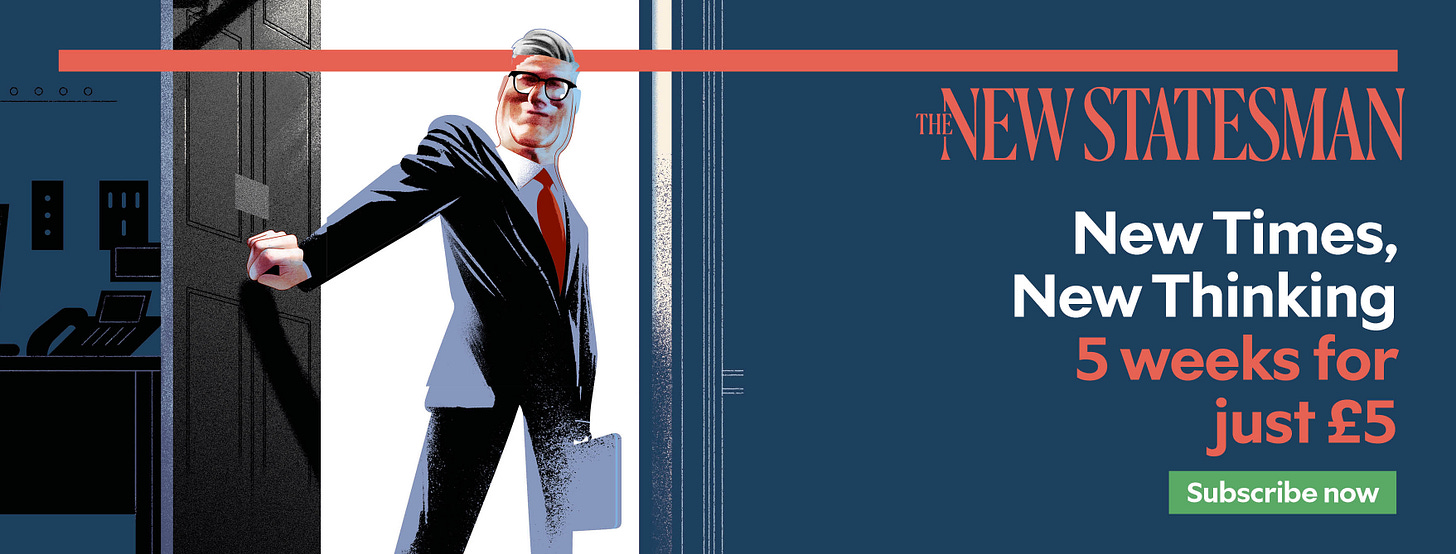Morning Call: Britain’s gift to Putin
British companies continue to play a significant part in Russia’s economy of oil and gas.
Good morning, Will here.
We awake to the news that Labour has won the Hamilton, Larkhall and Stonehouse by-election, taking the seat from the SNP and leaving Reform – currently embroiled in a “shit show” over the departure of chair Zia Yusuf – in third place. Across the Atlantic, Elon Musk’s involvement in the Trump administration appears to be following a trajectory familiar to anyone who has watched one of his rockets launch and then explode. The question is how aggressively Trump will respond to a challenge from his top oligarch. Vladimir Putin was once challenged by the wealthiest man in post-Soviet Russia, Mikhail Khodorkovsky, in February 2003. Putin used the incident to demonstrate to his other oligarchs that they worked for him; Khodorkovsky was arrested and spent a decade in a Siberian prison. Musk might need to be careful for once.
The oil trade that made Khodorkovsky rich is still going, and still represents a major component of the Kremlin’s revenue. Unfortunately, this is a trade in which Britain is also involved.
On Wednesday, Volodymyr Zelensky announced that Russia has now used more than 27,000 aerial bombs, more than 11,000 armed drones and thousands more guided munitions to attack Ukraine. Among the victims of this week’s attacks were an emergency worker, his wife and their one-year-old grandson, the 632nd child killed in Ukraine since Russia’s invasion. And yet British businesses continue to enable the Russian state to secure its main source of income: revenue from oil and gas.
New research shared exclusively with the New Statesman has found that since Russia's invasion of Ukraine, more than £200bn in Russian fossil fuel exports have been shipped using UK-based maritime services. A single UK-based firm has carried almost a quarter of Russia’s exports of liquefied natural gas (LNG) since the war began. While our government seeks to increase its defence budget, Britain’s active role in the Russian fossil fuel trade helps to maintain the military spending of a nuclear power currently at war with a close European ally.
The study, which has been conducted by the Centre for Research on Energy and Clean Air (CREA), finds that the value of Russian crude oil, oil products and LNG shipped under British ownership or insurance since the war began has now reached £205.8bn. Three quarters of Russian LNG carriers were covered by UK insurance.
Britain officially stopped importing Russian oil and oil products nine months after the invasion (it became illegal to do so on 5 December 2022). But a sanctions loophole means Britain keeps buying Putin’s products: Russian crude is shipped to refineries in Turkey and India and then returns as oil products. CREA estimates that the UK has indirectly bought £1.4bn in Russian oil through this loophole, providing more than half a billion pounds’ worth of revenue to the Kremlin. Much of the jet fuel taking British holidaymakers to sunnier climes this summer will have entered the supply chain in the oilfields of Siberia.
Europe continues to buy Russian LNG directly, and in 2024 imported more LNG from Russia than ever before. Much of this is shipped, entirely legally, by a single British company: Seapeak, which is headquartered in Glasgow and which owns seven specialist LNG carriers, which can power through ice two metres thick. This is not subject to a ban and there is no suggestion that Seapeak has broken any laws. Seapeak was mentioned in an Early Day Motion on Russian LNG, which was signed by 34 cross-party MPs in January. CREA says that Seapeak alone has carried Russian LNG worth £13bn since the war began.
Elsewhere, Russian fossil fuels are also shipped by a “dark fleet” of uninsured vessels, whose ownership is obscured. As I’ve previously reported, these ships pass in sight of our shores on an almost daily basis as they sail through the English Channel. Since Labour came to power, the UK government has taken a more determined stance towards sanctioning these ships and those who enable their sale, including an accountant who allegedly arranged for the sale of vessels. A government spokesperson told the New Statesman: “We are working with G7 and EU partners to eliminate remaining dependencies on Russian energy as soon as possible. We will not hesitate to take further action to increase economic pressure on Putin.”
Why can’t we stop paying Putin immediately? In a word: inflation. If Western countries entirely quit the Russian oil and gas habit, the wholesale price of energy would spike in a similar manner to 2022, bringing the price of almost everything else with it. The last inflationary surge cost the UK government £67bn in a single year in additional spending in support for consumers and businesses, and the population still endured a historic rise in the cost of living accompanied by strikes across the public sector. No government is going to impose that upon its voters, and even if it did, it wouldn’t last long.
This doesn’t mean there is nothing the UK can do. Energy analysts say it is a question of supply: when the oil and gas market has enough capacity to make a sudden drop in Russian fossil fuels less important, sanctions can be imposed and enforced. The pragmatic answer is probably then to secure LNG and crude from other countries. The most realistic answer to this problem therefore comes from productive diplomacy with the US for LNG, and Saudi Arabia and others for oil. In the long term, of course, it means not relying on fossil fuels, because we don’t have enough to power our country. Amid all the talk of how much we’re going to spend on our military, it’s important we also try to avoid paying for our enemy’s.
Will’s picks
Anoosh Chakelian’s unmissable investigation into Britain’s new-build nightmare.
Hans Kundnani on Europe’s far-right paradox.
And I’ve been reading Patrick McGee’s book on how the iPhone made China great again.
Mailshot
Independent: Zia Yusuf exit splits Reform
French and Stack: Did Ukraine’s drone strike change anything?
Helen Lewis: Intelligence won’t help
Germàn Saucedo: The God of Wes Anderson
Bindu Bansinath: A year without sex






The world has gone mad.
Can anyone imagine a situation in which Russia violated a NATO member and three years later we were still importing their fossil fuels. This is pure laziness, stupidity and ignorance. As for providing the ships and the insurance for these operations, because of a loophole (let me imagine what Churchill would have said about a loophole). “Action this Day“
was just one of the rubber stamps Churchill had at his disposal when reading his daily reports. A pity we had people like Johnson, Truss and Sunak during the first two years of the Ukraine invasion and a lawyer since July 2024. Action sometime, maybe, when nobody is looking is the most likely rubber stamps for today’s politician.